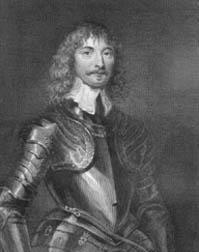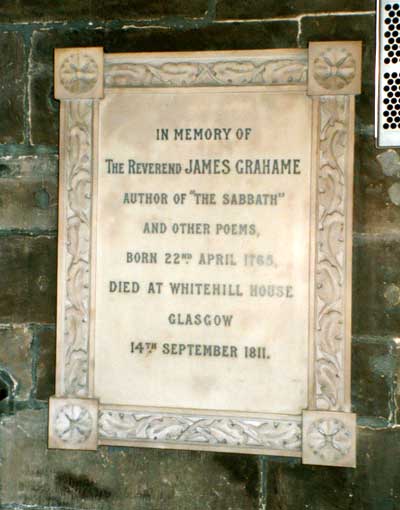Poet. He was an early 19th-century Scottish poet who was known for his 1804 poem "The Sabbath," which described the Scottish countryside. The poem was originally published anonymously, as well as other poems in the newspaper. Born the son of a successful lawyer, he attended the University of Glasgow, studying law, and was considered an excellent student. His schooling was paid for by a cousin. In 1791, he was admitted as a member of the Society of Writers to the Signet. Although he was accepted to the bar, he did not enjoy practicing law. He was a tall man with a dark complexion. He wanted to join in service to the church but waited until his father's death. At age 44, he took Anglican orders, becoming a curate. He was ordained by Dr Bathhurst, bishop of Norwich, on Trinity Sunday, May 28, 1809. His poor health prevented him from serving the church regularly, which disappointed him. Besides "The Sabbath," he wrote "Mary Queen of Scots" in 1801, "The Birds of Scotland" in 1806, "British Georgics" in 1809, and co-authored "Poems on the Abolition of the Slave Trade" in 1809. Lord Byron satirized him in "English Bards and Scotch Reviewers." In 1806, he published a well-written pamphlet on the subject of the introduction of jury trials in civil causes in Scotland, entitled "Thoughts on Trial by Jury." In 1802, he married and had two sons and a daughter. After a head injury years earlier, he suffered from episodes of chronic oppressive asthma and violent headaches before his death at age 46, leaving a widow with young children.
Poet. He was an early 19th-century Scottish poet who was known for his 1804 poem "The Sabbath," which described the Scottish countryside. The poem was originally published anonymously, as well as other poems in the newspaper. Born the son of a successful lawyer, he attended the University of Glasgow, studying law, and was considered an excellent student. His schooling was paid for by a cousin. In 1791, he was admitted as a member of the Society of Writers to the Signet. Although he was accepted to the bar, he did not enjoy practicing law. He was a tall man with a dark complexion. He wanted to join in service to the church but waited until his father's death. At age 44, he took Anglican orders, becoming a curate. He was ordained by Dr Bathhurst, bishop of Norwich, on Trinity Sunday, May 28, 1809. His poor health prevented him from serving the church regularly, which disappointed him. Besides "The Sabbath," he wrote "Mary Queen of Scots" in 1801, "The Birds of Scotland" in 1806, "British Georgics" in 1809, and co-authored "Poems on the Abolition of the Slave Trade" in 1809. Lord Byron satirized him in "English Bards and Scotch Reviewers." In 1806, he published a well-written pamphlet on the subject of the introduction of jury trials in civil causes in Scotland, entitled "Thoughts on Trial by Jury." In 1802, he married and had two sons and a daughter. After a head injury years earlier, he suffered from episodes of chronic oppressive asthma and violent headaches before his death at age 46, leaving a widow with young children.
Bio by: Linda Davis
Inscription
In Memory of Rev. James Grahame
Author of "The Sabbath" and other poems.
Advertisement



